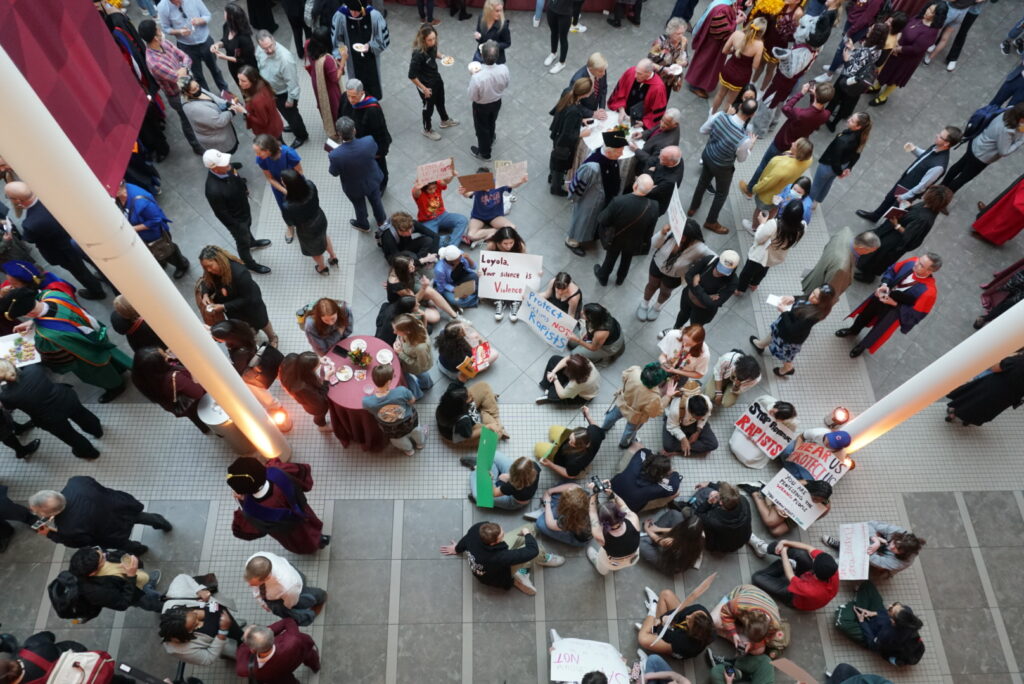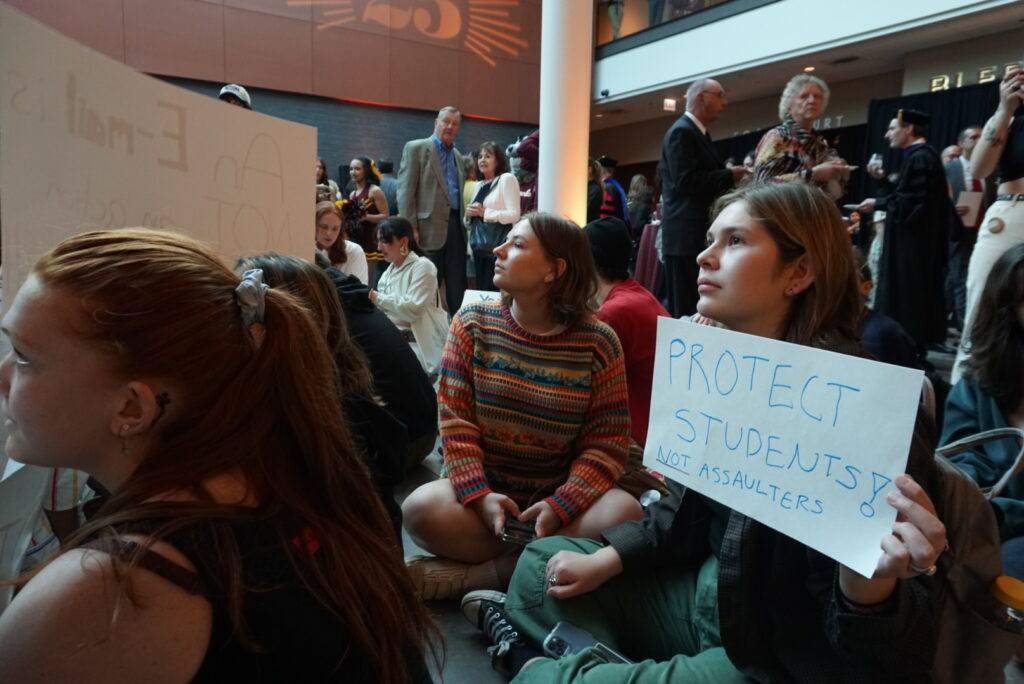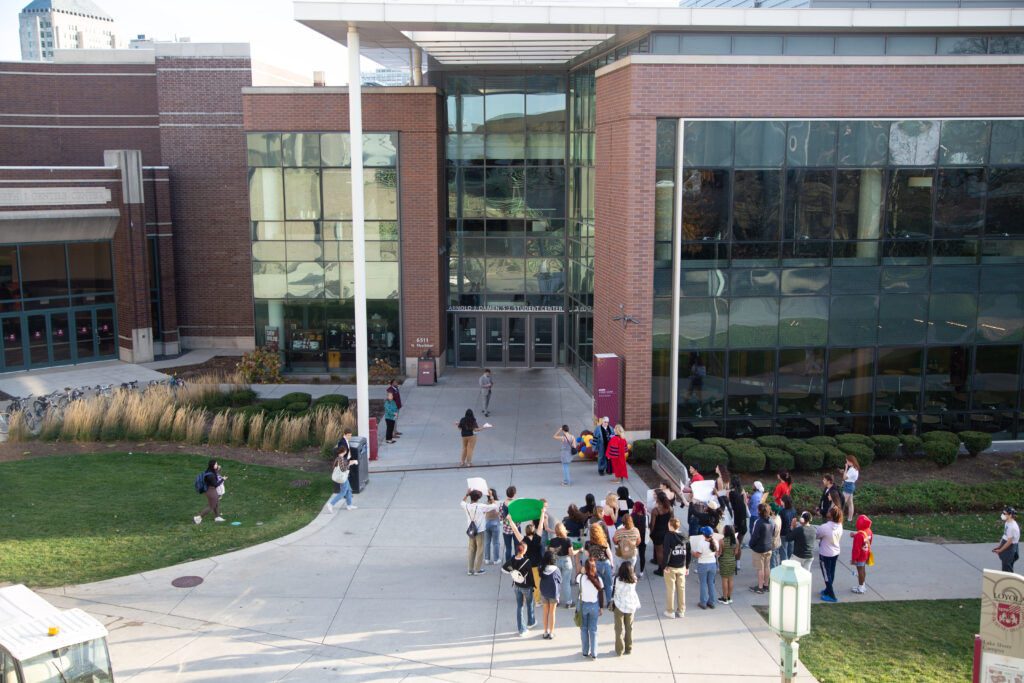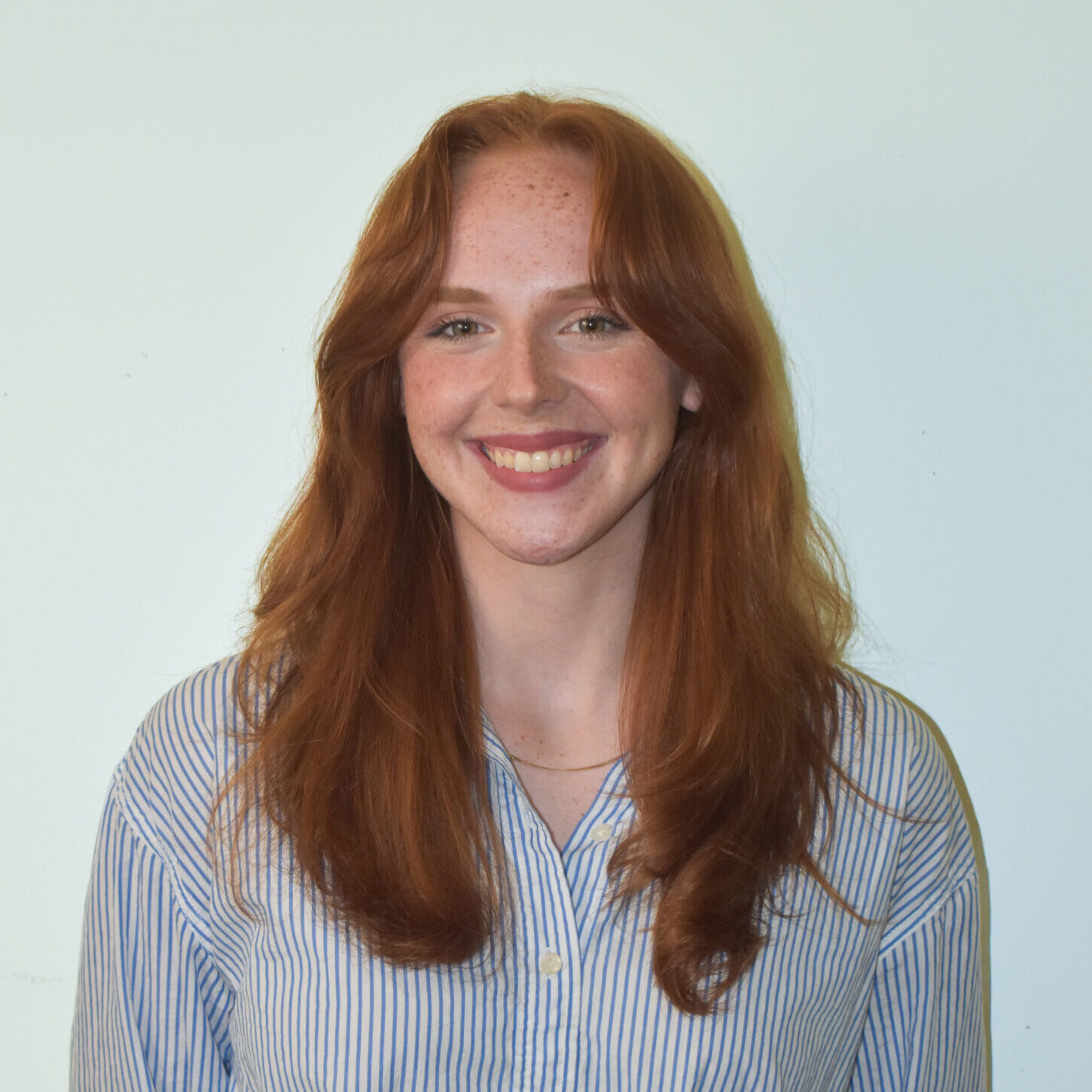Students protested inside Damen Student Center against Loyola’s handling of sexual assault allegations during President Mark C. Reed’s inaugural community reception on Nov. 3.
BREAKING: Students Protest Sexual Assault Allegations During Presidential Inauguration Event
Content warning: Sexual assault, rape, vulgar language
Students protested against Loyola’s handling of sexual assault allegations during President Mark C. Reed’s inaugural community reception on Nov. 3. The crowd of approximately 50 people gathered outside of the Damen Student Center before entering the building and performing a “sit-in,” where they sat amongst those in attendance.
The demonstration, which was called an “inauguration protest” by those involved, was planned by an anonymous social media account known for exposing people accused of sexual assault at Loyola. The protest began at 3:25 p.m., just before the end of the inauguration of Loyola’s 25th president and lasted until 4:30 p.m.
Throughout the protest, demonstrators voiced multiple complaints towards university officials in attendance including William Rodriguez, the dean of students and assistant vice president of student life and engagement, for not allowing them to enter the building as demonstrators.
Rodriguez declined The Phoenix’s request for comment.

University officials said the student center was reserved until midnight for inaugural activities and pointed to the Community Standards on Free Expression policy which states, “Demonstrations may not take place indoors with the exception of the Damen Student Center (LSC) and the Terry Student Center (WTC), or in any space that has been concurrently reserved by other members of the University community or guests.”
Loyola spokesperson Matt McDermott said the university supports students’ rights to express their opinions and perspectives in an email to The Phoenix.
“As a Jesuit, Catholic university, we advocate civil discourse and hearty debate and strongly believe it advances education, engagement, and understanding,” McDermott wrote. “We support students who express their views through respectful and responsible means, as it is a hallmark of the intellectual vitality and social awareness of our student body.”
After the sit-in, which lasted approximately 10 minutes, the demonstrators were asked by university officials to leave the student center shortly after entering. They continued to protest by walking around the building chanting, “Fuck Loyola” and, “Silence is violence.”
Protesters then tried to enter the building from the west entrance but were confronted again by Rodriguez and other university officials.

Ayesha Chaudhry, a sophomore who said she didn’t help plan the demonstration but was leading the protest, told the crowd about a conversation with Rodriguez concerning their entrance into the building.
“I have been told we can’t walk in without our signs, we can’t walk in and be quiet, we can’t walk in and talk, we can’t even walk in as students unless we go in individually and are not demonstrating,” Chaudhry said.
Chaudhry told the crowd she was disappointed the university wasn’t prioritizing student opinions.
“If you’re a donor then they care about your opinion,” Chaudhry said to the crowd. “If you’re an alumnus that’s gonna spend a shit ton of money here, they care about your opinion. But if you’re going into debt to go to this school, if you are leaving your family to go to this school, they dont give a shit what happens to you.”
All current students, faculty, parents and alumni were invited to the all inaugural events.

Toward the end of the protest, Rodriguez approached and spoke to demonstrators directly.
Matthew Slattery, a first-year political science major, said he was protesting for the family and friends who he knows are impacted by this issue.
“I have sisters, I have a mother, I have friends who are girls who are scared to be here,” Slattery said.
Sevvy Hayes, a first-year student, said she was protesting because of how many issues she has heard of involving sexual assault on university campuses.
“I have had a lot of friends who have been assaulted and have had nothing happen, and I am kind of tired of having it just being brushed under the rug and ignored by universities and schools in general,” Hayes, a double major in criminology and psychology said.
The Office of Division and Student Development sent an email Oct. 25 to all students, staff and parents acknowledging the sexual assault allegations which have been occuring on campus.
“Many of you may be aware of social media posts concerning allegations of sexual assault involving members of our student community,” Dr. Keith Champagne, vice president of student development, and Samantha Maher Sheahan, associate dean of students wrote. “To any student who has experienced sexual violence, we see you, we hear you, and we are here for you. You are not alone.”
Champagne did not immediately respond to The Phoenix’s request for comment following the protest. Sheahan referred The Phoenix to McDermott’s comment.
She said she wants the university to do more than simply acknowledge the allegations of sexual assault from students.
“It feels like there could be more said and done than just an email,” Hayes said. “At the same time I also understand that there is more to the story than we probably understand or know.”
Towards the end of the protest, students made plans to return to campus the next day to continue the protest inside Damen Student Center.
Featured image by Austin Hojdar | The Phoenix
-

Lilli Malone is the News Editor of The Phoenix and has written for the paper since the first week of her first-year. She is studying journalism, criminal justice and political science, is on the board of SPJ Loyola and was previously the deputy news editor of The Phoenix. She has worked as a Breaking News Correspondent for The Daily Herald, and has interned at Block Club Chicago, Quotable Magazine, and UCLA. Originally from Columbus, Ohio, Malone enjoys traveling, reading, and telling the stories of Loyola and Rogers Park community members.
View all posts
Topics
Get the Loyola Phoenix newsletter straight to your inbox!


